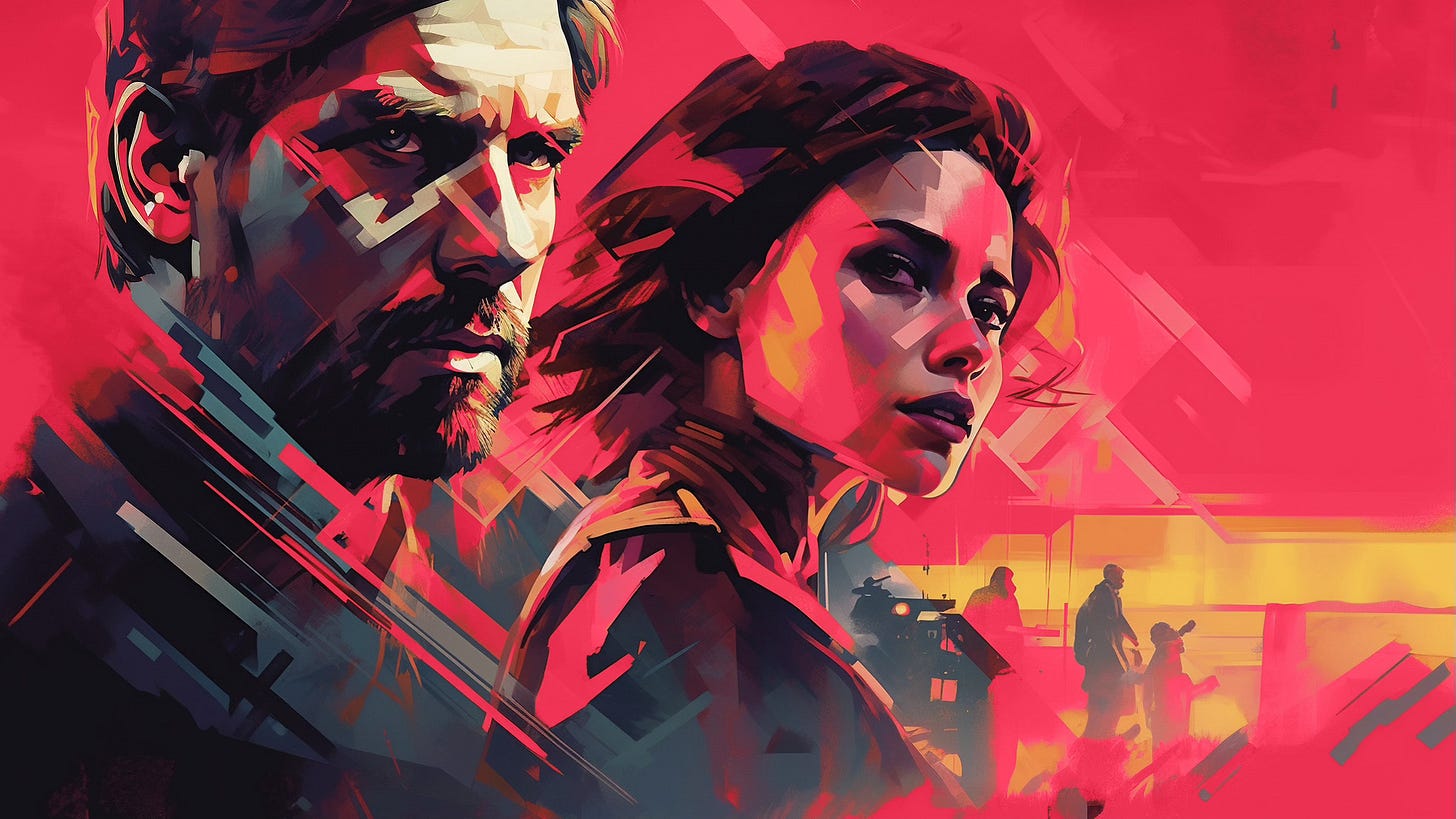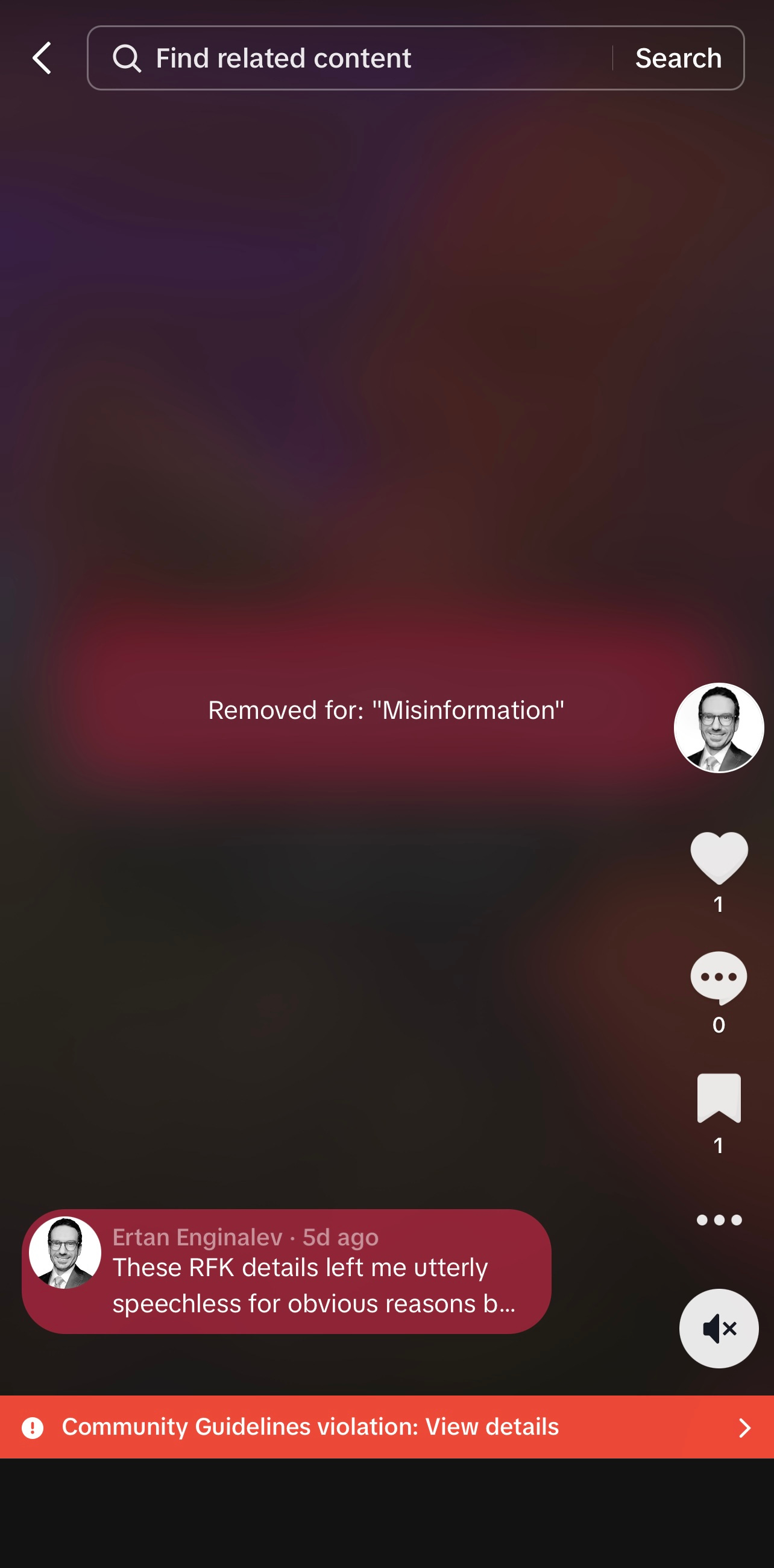A Chokehold on Democracy: The Censorship Irony in the Age of Social Media
Dive deep into the RFK Jr. censorship saga and its implications on democracy
It's fascinating — and deeply troubling — how our world has morphed into one where fact-checking has become the new censorship, where the powers-that-be decide which narratives are allowed to have a platform. As the late, great George Orwell penned, "If liberty means anything at all, it means the right to tell people what they do not want to hear."
It's under this shade of distressing irony I'm drawing attention to a recent incident, one that stinks of digital authoritarianism and hypocrisy. Robert F. Kennedy Jr., the U.S. presidential candidate, found himself ensnared in the web of TikTok's content moderation. His content was removed from the platform and deemed as misinformation. The victim of this censorship, as it happens, was yours truly.
Imagine my surprise when the below 10-minute clip from a Bill Maher podcast interview with RFK Jr., advocating for an investigation into his father's assassination, was removed from my TikTok profile. Yes, TikTok flagged an interview snippet that had been viewed more than 400,000 times at the time on YouTube as misinformation, handed me a community strike, and nuked it from my profile. Barely had the virtual ink dried on the upload button, when the digital censorship hammer came crashing down. The whole process was as murky as it was swift, a clear testament to a bot or an algorithm devoid of human sensibility.
Naturally, I filed an appeal — convinced the take-down and ‘misinformation’ label had been some sort of system error. It was not and my appeal was rejected within minutes.
Now, I'm no stranger to the world of business. I've navigated the fiercely competitive landscape of media, cutting my teeth in the intricacies of nuanced decision-making. I've weathered the storms of corporate hypocrisy, knowing full well that consistency is the keystone of public trust. But when the inconsistency rises to the level of choking the voice of presidential candidates, it's time to sit up and take notice.
Remember when TikTok took the state of Montana to federal court, arguing that the state's ban on the app was suppressing free speech? I find it peculiar that a platform so vehemently protective of its own voice willingly squashes that of a prospective leader of the free world. One rule for them, another for us, it seems.
This is not just about TikTok or any other social media giant. This is about the future of our democratic discourse. The Internet was supposed to be a beacon of freedom, a town hall of ideas, a platform where citizens could engage in meaningful dialogue and make informed decisions. Yet, when a giant like TikTok starts to pick and choose what content is acceptable, what narratives are valid, and which voices deserve to be heard, it becomes a gatekeeper rather than a facilitator.
I remember a time when the major networks were the gatekeepers of news and information. Now, every social media platform gets to act as judge, jury, and executioner without any real transparency or accountability.
Where is the Shou Chew that stood before Congress, pledging to uphold the principles of open dialogue and informed decision-making? The stance seems a far cry from the truth, replaced with a blatant disregard for content diversity and an arbitrary enforcement of community standards.
This level of censorship distorts the democratic process by controlling public access to information. It's like casting a veil over our eyes, deciding what we should see, what we should know. It feels eerily similar to the dystopian worlds described in novels, worlds we never thought we'd have to navigate.
It's about time we reclaim our narratives from the clutches of digital overreach. There's a shared responsibility to uphold the integrity of our democratic discourse. Social media platforms like TikTok, with its enormous reach and influence, can play a significant role in shaping our collective future. But the question is, are they up for the task? Or will they continue to hide behind the veneer of community guidelines, selectively silencing voices that don't fit within their prescribed narratives?
Let's not allow our democracy to be choked by the unchecked powers of social media censorship. The stakes are too high, the implications too dire. In the end, we must remember, it's not just about one clip or one presidential candidate, it's about preserving our right to information, our right to be heard, and most importantly, our right to choose.
Below is the email I sent Adam Presser, COO of TikTok US following the incident as I’m a firm believer in giving people, and companies, the opportunity to address their respective mistakes before going public and escalating matters:
Dear Adam,
I am writing with deep concern regarding the clear inconsistencies in TikTok’s community policy enforcement actions, which contradict TikTok’s professed commitment to free speech and fair political participation. Censoring and removing content from Robert F. Kennedy Jr. — a US presidential candidate — undermines our democratic process, raising questions about the integrity of our elections and limiting public access to diverse perspectives.
Simultaneously, TikTok’s federal lawsuit against the state of Montana, challenging its ban on your app, seems contradictory. While TikTok argues that the ban suppresses free speech, censoring a US presidential candidate runs counter to its claims. Consistency is paramount to ensure public trust in your commitment to democratic principles.
A concrete example of TikTok’s censorship (one of many) is the removal of a 10-minute video clip from a recent YouTube Bill Maher podcast interview with Robert F. Kennedy Jr. from my TikTok profile.
The removed interview clip featured Robert F. Kennedy Jr. advocating for an investigation into his father’s assassination — an issue of public interest. However, the video was immediately labeled as misinformation and removed upon upload, resulting in a community strike on my account. This swift action and subsequent appeal rejection, both completed within mere minutes, clearly indicate an automated process that failed to consider the context and importance of the content.
Such censorship not only hampers the democratic process but also restricts the public’s access to diverse viewpoints and vital discussions. It is crucial that platforms like TikTok uphold transparency, consistency, and fairness in content moderation to promote the open dialogue and informed decision-making that Shou Chew highlighted as a corporate priority in his testimony before Congress.
Preserving a level playing field for political candidates is vital for fairness and equal opportunity. By engaging in content censorship, your company risks distorting public access to information and exerting undue influence on the electoral process.
Please reflect on these concerns and apparent policy inconsistency. Preserving the integrity of our democratic discourse is a shared responsibility, and TikTok can play a significant role.
Thank you for your attention.
Kind regards,
Ertan



